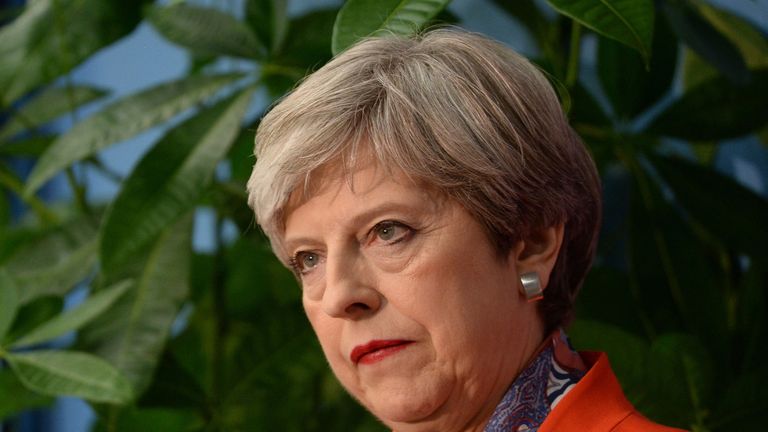Maybot or Terminator? Prime Minister Theresa May survives brutal year
It's been argued that Theresa May has never been in a stronger position, but Sky's Faisal Islam examines what has really changed.
Saturday 23 December 2017 08:39, UK
Perhaps the real Maybot was in fact the Terminator. Theresa May seems to take everything that politics can throw at her and is still left standing after the end of a brutal year.
Near the end of each quarter of this extraordinary political year, it has been argued that Theresa May has never been in a stronger position.
A year ago, there was high anticipation of her Lancaster House speech, then we had the aftermath of Article 50, the presumption of a thumping election win, the signing of the DUP deal and a relatively quiet summer.
And so as we enter the end of the entire year, so the pattern repeats.
But it really only goes to show how low are the expectations. The PM has survived 2017. She is the Great Survivor. That in itself is quite a feat. But every time things look like settling, another fundamental problem pops up.
Now, following this week she will have to keep the Brexit spinning plates going, her Cabinet, her Party, Parliament, the public, the business community, the European Commission and the EU27.
But it is easy to forget that even asking the question of survival is a reflection of an historic mistake and misjudgement on the election.
Shares in Theresa May seem to oscillate pretty wildly in the political market place. No more greatly of course than in May.
Mrs May's month began as a thumping political colossus, delivering spectacular local election results, ending it being chased down by Jeremy Corbyn and on course to lose a majority that some thought would be around 150.
And one of the reasons why this pattern is guaranteed to endure is that the fundamental fragility has not changed.
Minority governments can survive as long they don't do controversial things or have to pass deeply contested legislation. Brexit means that there are reams of such legislation - with the EU Withdrawal Bill yet to complete the Commons, and the Immigration Bill soon on its way too. All this against a backdrop of tougher negotiations.
Make no mistake - the DUP implicitly threatened to pull the plug on the confidence and supply deal this month when news suggesting the PM was to sign up to a "no regulatory divergence" deal for Northern Ireland emerged. That was their leverage as Arlene Foster's phone call astonishingly interrupted the PM's lunch with Jean-Claude Juncker.
A certain degree of trust in that relationship has been burnt. And the fundamental problem has not been solved. Indeed it could even blow up pretty quickly around the legal text drafting of the "full alignment" part of the Phase 1 Agreement.
Her great negotiation victory was to bring the Brexiteers in her party, including in Cabinet, to the point of accepting a £39bn financial settlement and some continuing European Court of Justice role into 2027.
That is now being used as a template for other areas where ECJ jurisdiction needs to be fudged to maximise the retention of EU market access for UK firms after Brexit.
But at some point it will become clear that the Bill will become a legally binding treaty obligation without the UK having signed a fully fledged free trade agreement. Can this be dodged? Only with a model of post-Brexit trade that requires little or no change, currently unacceptable to Brexiteers.
And yet the PM undoubtedly needs a deal, because she has accepted the argument from big investors and business that the country needs a transition.
The now departed Damian Green was a powerful voice for a practical and pragmatic Brexit. Replacing him as First Secretary may or may not happen, but his position on the key Cabinet subcommittees will have to be replaced.
The bigger question though is this - will the PM have a vision for Brexit Britain that goes beyond survival and beyond incremental progress in the negotiation?
The reason why her share price oscillates wildly is that she has not reunited the country after the divisive EU referendum.
The generational, social and political divides were further entrenched in the General Election.
It was those divides which enfranchised many of the Tory rebels in the lost EU Withdrawal vote, to vote against their Government.
They have crossed a red line - and will do so again, as the House of Lords digests the same EU Withdrawal Bill. And of course there are complications with the devolved administrations - an issue being handled by Damian Green.
So what is her vision that unites the Cabinet, the Party, commands a Parliamentary majority, solves the Irish border conundrum, leads to a quick transition deal, and can be agreed in a tight timescale with the European Commission and EU27?
So Theresa May leaves 2017 in place. But the fundamental difficulty still exists. Except in this coming year, these things can not be fudged again.
She is there, she gets to start to make these decisions and find solutions to what seem like intractable problems. But she is not in a fundamentally better position.
It may take a few weeks of 2018 to reveal itself, but to reuse a familiar phrase, "Nothing has changed".







